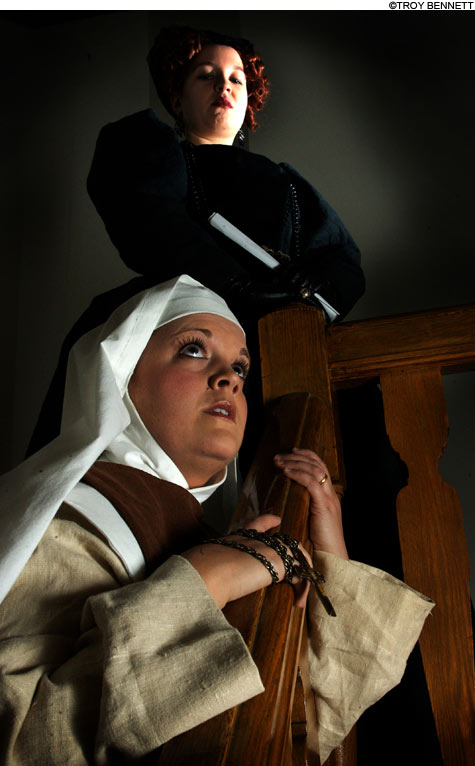
EXPRESSING HUMANITY Faces and hands in Suor Angelica. CREDIT TROY BENNETT |
This week, Heaven, Hell, and moral ambiguity receive two sonorous treatises at the University of Southern Maine: The tragedy of Suor Angelica and the comedy of Gianni Schicchi are two one-act operas from a triptych by Giacomo Puccini, inspired by Dante's Divine Comedy. They are produced in a virtuoso collaboration between USM's School of Music and the Department of Theatre, under the fine direction, respectively, of Ellen Chickering and Assunta Kent. Robert Lehman conducts the | SUOR ANGELICA AND GIANNI SCHICCHI | by Giacomo Puccini | Stage Direction by Assunta Kent | Musical Direction by Ellen Chickering | Conducted by Robert Lehman | Produced by the University of Southern Maine's School of Music and Department of Theatre | at Russell Hall in Gorham | through March 21 | Reservations required; 207.780.5151 |
outstanding Southern Maine Symphony Orchestra in these sumptuous two productions, a interdepartmental partnership orchestrated only once every four years.The evening's exploration begins in a 17th-century Italian convent, with the lyrical Suor Angelica. Sister Angelica (the dulcet Sarah Mawn, who alternates performances with Stephanie Gilbert) is a repentant "fallen woman," consigned to the order for some years now after bearing a child out of wedlock. When her merciless royal aunt, the Principessa (the excellent Jazmin DeRice), surprises everyone with her first ever visit to the convent, Angelica seeks affection and news of her son, but is to be given no solace.
Suor Angelica transpires over the course of a single day, amid the warm terra cotta hues of the convent (Alessandra Turati's graceful set design). Time's passage is beautifully rendered through lighting (by the ever-excellent JP Gagnon) that moves through bright morning, the gold of afternoon, and finally to dark indigo. The action opens as, late to morning chapel and accompanied by lively piccolo and plucked cello, Angelica and two other nuns linger on their way, thrilled by the brilliance of morning. From these opening strains of score and movement, the superbly sung production reveals itself as a sensuous confluence of music, light, and emotion.
Ruled by the Order's conventions of propriety, Angelica and the cloistered women are necessarily limited in their gestures of emotion; garbed in plain habits and long dresses, the most flesh they may reveal is in hands and moons of faces. One of the most enchanting elements of Suor Angelica is how expressively the performers convey their humanity: Faces glow with pleasure at sunlight, a bit of gossip, and the treat of fresh grapes. Contrast their simple openness to the spectacularly stiff artifice of the Principessa: Corseted and draped in rich black fabrics (Kris Hall's gorgeous costume design), DeRice's copper-haired, red-lipped Princess plays leather-gloved fingers over her cane with cruel, worldly calculation. Confronted with her, Mawn's Angelica relates an array of emotions — hope, anger, despair, beatitude — with fine physical eloquence, from her eyes to the set of her mouth and even her fingers, slightly splayed in the fervor of her prayer.